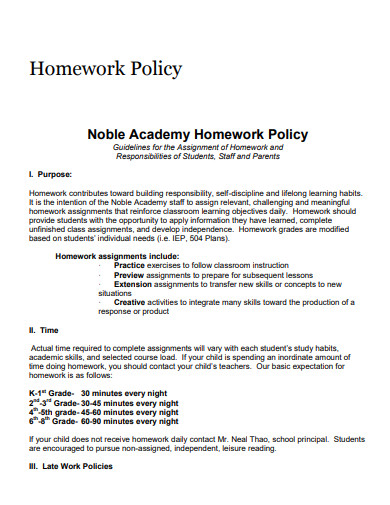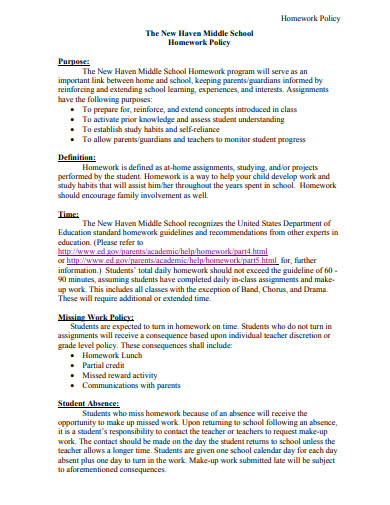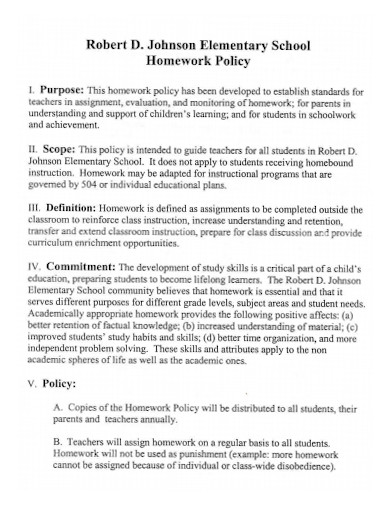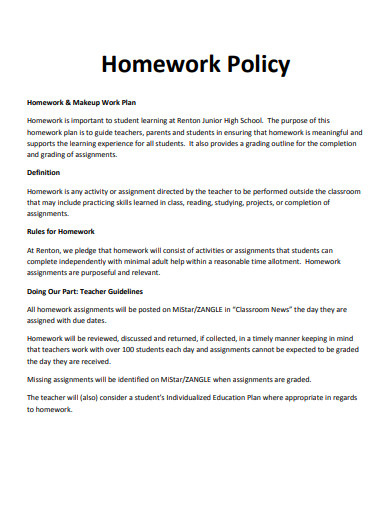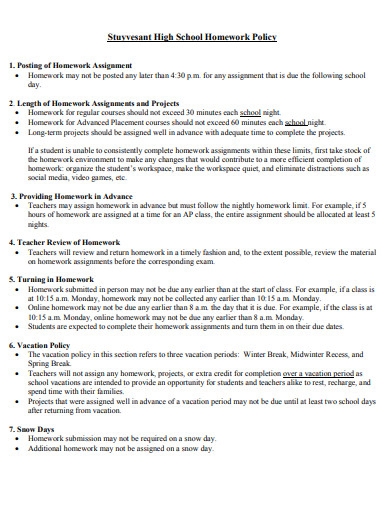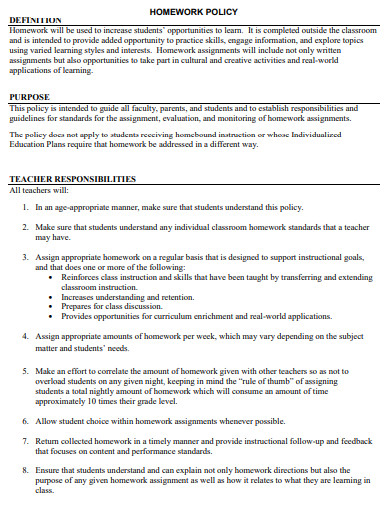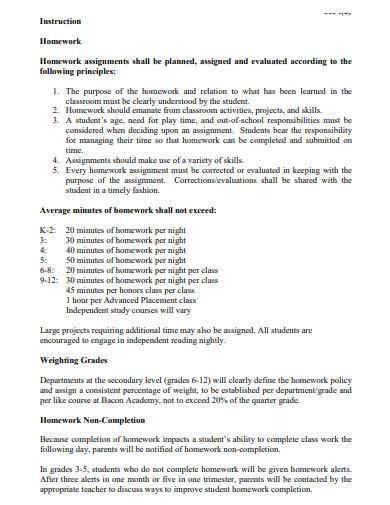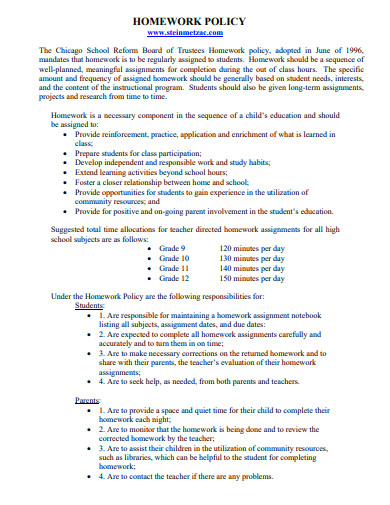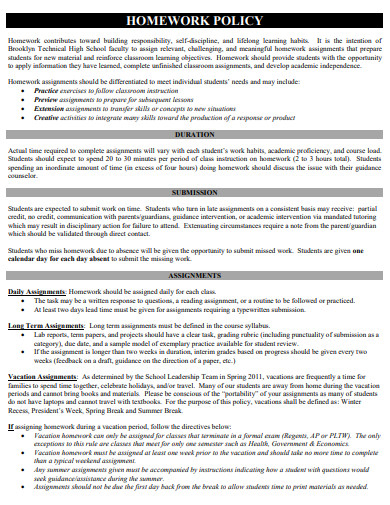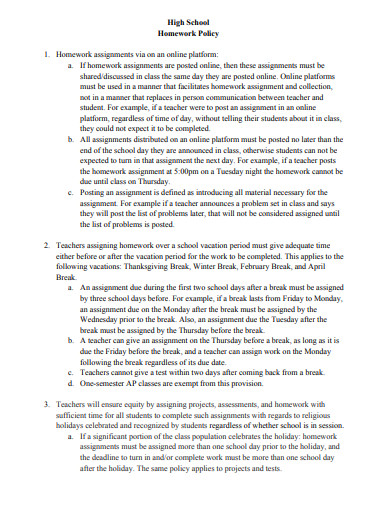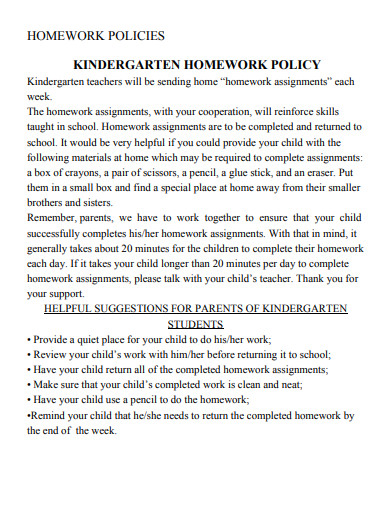10+ Homework Policy Examples to Download
We’re all aware of how students dread homework. They don’t like the idea of doing schoolwork at home after spending a whole day in school. We know how that feels. We’ve all been there during our elementary, high school, and college years. Although laziness is among the reasons, there are credible justifications for why students hate homework. That’s why some schools have imposed policies to regulate homework. Too much homework can be counterproductive. So as a school admin, if you see that your teachers are overworking students with homework, make your move to control it. You can start by downloading our Homework Policy Examples!
10+ Homework Policy Examples
1. Homework Policy Template
2. Middle School Homework Policy
3. Elementary School Homework Policy
4. Sample Homework Policy
5. High School Homework Policy
6. Homework Policy Example
7. Basic Homework Policy
8. School Homework Policy Template
9. Homework Policy in PDF
10. High School Homework Policy Example
11. Kindergarten Homework Policy
What Is a Homework Policy?
A school homework policy is a set of guidelines on how often teachers should give homework or what type of homework they should give. Its main function is to protect students from being overworked and ensure that their homework is beneficial to their learning.
Homework policies are an important aspect of classroom management. It’s crucial not to drown students with school work. They need time to breathe from doing study activities. Other than that, some teachers might be giving homework that contributes nothing to their studies. Homeworks that are irrelevant only serves to waste the students’ time and energy. But with a homework policy elementary school, high school, or college, that won’t happen.
The Purpose of Homework in Schools
At the start of this blog, we’ve been shedding a bad light on homework inadvertently. Giving a home assignment to a student has some benefits. After all, homework wouldn’t exist in the first place if it doesn’t have a real purpose.
One purpose of homework is to push students to immerse themselves more with their studies. That helps them to absorb what they’ve learned during classes more effectively. It keeps their learning process consistent outside of the classroom. And also, homework teaches students to be responsible and professional, especially when it comes to meeting deadlines.
Another function of homework is that it can be a way for parents to be more involved in their children’s education. They can monitor what lessons their kids are studying by seeing what sort of schoolwork they’re doing at home.
How to Create a Homework Policy
Among the first steps you must take to protect students from too much and irrelevant homework is creating a homework policy. To get you started, we’ll show you our short 4-step guide below.
Step 1: Conduct a Survey
In general, conducting a survey is the first step in formulating policies. In this case, you need to survey the students regarding their homework duties. Your survey form must ask the right questions, such as how homework affects them mentally and how useful it is in the lesson plan. Find out how functional the students’ homework is to see its pros and cons.
Step 2: Communicate with Faculty
Imposing a homework policy is a drastic change in your school’s teaching process. That said, you should communicate about it with your faculty staff. Based on the findings of your survey, let your teachers know what specific regulations you’ll impose in terms of giving homework. You may also ask if they have suggestions or objections about your proposed policy. If there are, you can make some adjustments if you see them fit.
Step 3: Write Down the Regulations
After you make adjustments and finalize everything, write the homework regulations in a document or memo. Make sure to explain each of them in detail. Justify how each regulation is helpful for the students’ learning and well being. For instance, if one regulation is a No Homework on Fridays, you can justify it by saying students need the weekends to spend more time with friends and family. And that it gives them a chance to refresh their minds from school pressure.
Step 4: Add the Homework Policy to the Student and Teacher Handbook
To make the homework policy an official school policy, integrate it into the teacher and student handbook. In doing so, both faculty and students will be more aware of it. That way, the homework policy will slowly but surely become a norm in your school. The teachers, especially, will follow it strictly.
FAQs
What is the 10-minute rule in homework?
The 10-minute homework rule, as its name implies, suggests that teachers should only give homework that students can finish in under 10 minutes. However, this rule mostly only applies to first graders.
What type of homework is considered meaningful?
The type of homework that’s meaningful are those that are in-line with the curriculum and beneficial to the learning process. Meaningful homework complements the lesson plan significantly. And they’re doable depending on the students’ current level of capability. A homework that adds nothing to the students’ progress is merely a to-do task.
Is it too much to give two hours of homework?
According to the Stanford Graduate School of Education, beyond two hours of homework is too much. Having more than two hours of homework to do has three negative effects on students. These are:
- Increase in stress levels, affecting productivity
- Health risks, such as sleep deprivation, severe weight loss, and exhaustion
- Less time with friends and family, which can lead to depression and neglect of schoolwork
Homework is an integral part of your school’s teaching methods. It is an extension of your school’s guidance for the students outside the classroom. But there have to be limitations. So start making a homework policy now. And don’t forget to download our Homework Policy Template.



